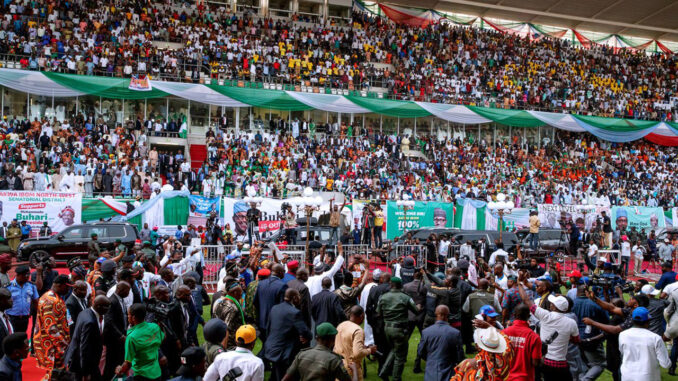
As the opening of political campaign approaches in two days time (September 28, 2022), there is ‘a motivational must’ to comment again on the necessity for issues-based campaign by all aspirants to political office. This point, so widely made by others, cannot be said enough. For too long, but especially lately, the public space has been largely dominated by focus on personalities and personal traits-good and not so good.
No one can deny the necessity to scrutinise the person of any aspirant to high office. It is not only appropriate, but it is a legitimate duty and right of the electorate to do so. Leadership is a trust, those who seek to lead a people must prove first, and beyond reasonable doubt, their moral authority to lead. To adapt the words of a former American president, leadership in high public office is preeminently a place of moral leadership. In this respect, character, in its fullest ramifications, is a primary and fundamental factor for deep consideration.
But other crucial matters need to be on the table of discussion. Assuming aspirants scale in the considered opinion of Nigerians ‘‘the character assessment hurdle,’’ arguably the next most salient question is what each aspirant is offering Nigerians to not merely improve on the performance of the sitting leader, but lift this country out of the mess that its leaders have put it.
So far, most, but not all, of the aspirants have not shown that deep and hard thinking have gone into their preparations to govern Nigeria, or a part thereof. Beyond stating the obvious and worn problems that confront their country, and which just about every thinking citizen knows and feels, aspirants have not told the people how, which is to say by what strategy, they will move from ‘a statement of the problems’ to ‘ a solution of the problems.’ This is a question of implementation. Take a few examples.
It is established that a nation is built on the character and quality of its people. Great nations and countries are products of their morally upright, well-educated and well-skilled citizens who have zero tolerance for that heinous overarching word ‘corruption’. Corruption is killing the spirit, soul, and body of Nigeria. What do the presidential candidates intend to demonstratively do quickly and firmly to curb corruption?
They say leadership by example works best. As a ‘guru’ in leadership training John Maxwell would say, a leader must know the way, show the way, and go the way. Nigerians will want to hear political aspirants commit themselves, on the pain of publicly self-defined sanctions, to eschew acts of corrupting (including nepotism), in sum, to lead by example.
How do aspirants intend to enrich the human capital of the country or their states? Everyone acknowledges that Nigeria is blessed with enormous natural resources. But people make all the difference in development. This has been proven so clearly by such countries as Israel, Japan, and Singapore. As E.F. Schumacher wrote in his book Small is Beautiful, ‘there is no such thing as the viability of states or of nations, there is only a viability of people.’ Chief Obafemi Awolowo thought so too by asserting that people are the engine of development. To this end, he concentrated maximally on education to build the human capital of his people in the conviction that other ‘blessings’ would accrue therefrom. He recommended: ‘‘In order to attain to the goals of economic freedom and prosperity, Nigeria must do certain things as a matter of urgency and priority. It must provide free education at all levels and free health facilities for the masses of its citizens.’’
On Singapore cited earlier, Daniel Goleman (2013) wrote: “Singapore has no natural resources, no great army, no special political sway. Its secret lies in its people – and the government has intentionally cultivated this human resource as the driver of the economy. Schools are the incubator for Singapore’s outstanding workforce.” So, we directly ask every aspirant to leadership in the next election: ‘‘what do you intend to do to develop Nigeria’s human capital, and how in clear and specific terms will you achieve this?’’
It is common to note, rightly though, that Nigeria suffers ‘infrastructure deficit’ and that this is a major cause of little productivity and in turn, the underperforming economy. A country of over 200 million people cannot develop nor progress on 3000 – 5000 MW supply of electricity. It is, for obvious reason, not at all possible. ‘Energy security’ is as critical to the health of a modern economy as food security is to the social wellbeing of a country. What does each candidate plan to do and how, to substantially increase power output and enable industries – small and big- operate more productively and less expensively?
A country that cannot feed itself will be indebted to its food supplier. Indeed, food security is arguably the first of human and national security. We challenge every aspirant to publish research-based, data driven understanding of Nigeria’s current food needs, what gaps exist and where; and how these gaps will be bridged.
• To be continued tomorrow.
END

Be the first to comment